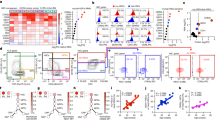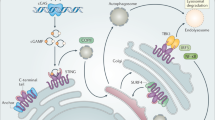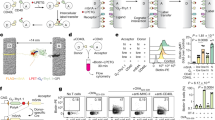Summary:
Zinc is an essential trace element for the immune system. Previously it was shown that zinc inhibits alloreactivity. In our present in vitro experiments, it is shown that zinc maintains the antigenic potency of the host while blocking the allogeneic response. These results were observed in experiments using tetanus toxoid as a well-established recall antigen and the mixed lymphocyte culture as an in vitro model for allogeneic reaction. To prove the in vivo relevance, an ex vivo experimental setup was established. This involved participants taking zinc orally for 1 week. Here it is shown that in vivo zinc application induced the same effect of blocking the mixed lymphocyte culture without influencing tetanus toxoid stimulation. So far, no clinical application studies have been performed, but the observed selective suppression of allogeneic reaction by zinc is the first step towards a new generation of immunosuppressants.
This is a preview of subscription content, access via your institution
Access options
Subscribe to this journal
Receive 12 print issues and online access
$259.00 per year
only $21.58 per issue
Buy this article
- Purchase on Springer Link
- Instant access to full article PDF
Prices may be subject to local taxes which are calculated during checkout






Similar content being viewed by others
References
Danzer SG, Rink L . Cytokines in mixed lymphocyte culture as a prospective parameter for transplantation. Med Klin 1996; 91: 494–500.
Hayry P, Andersson LC, Nordling S et al. Allograft response in vitro. Transplant Rev 1972; 12: 91–140.
Klein J, Chiang CL . Ability of H-2 regions to induce graft-vs-host disease. J Immunol 1976; 117: 736–740.
Danzer SG, aCampo A, Kunze B et al. Identification of HLA-DRB1 and HLA-DQB1 identical individuals by a cytokine-based mixed lymphocyte culture. Lymphokine Cytokine Res 1994; 13: 303–308.
Acha OH, Held W, Scarpellino L et al. Mls: a link between immunology and retrovirology. Int Rev Immunol 1992; 8: 327–336.
Dickinson AM, Sviland L, Hamilton PJ et al. Cytokine involvement in predicting clinical graft-versus-host disease in allogeneic bone marrow transplant recipients. Bone Marrow Transplant 1994; 13: 65–70.
Danzer SG, aCampo C, Rink L . Interferon-gamma plays a key role in the human mixed lymphocyte culture. Bone Marrow Transplant 1996; 18: 991–996.
Mihatsch MJ, Kyo M, Morozumi K et al. The side-effects of cyclosporine-A and tacrolimus. Clin Nephrol 1998; 49: 356–363.
Wellinghausen N, Kirchner H, Rink L . The immunobiology of zinc. Immunol Today 1997; 18: 519–520.
Wellinghausen N, Rink L . The significance of zinc for leukocyte biology. J Leukoc Biol 1998; 64: 571–577.
Rink L, Gabriel P . Zinc and the immune system. Proc Nutr Soc 2000; 59: 541–552.
Allen JL, Perri RT, McClain CJ et al. Alterations in human natural killer cell activity and monocyte cytotoxicity induced by zinc deficiency. J Lab Clin Med 1983; 102: 577–589.
Keen CL, Gershwin ME . Zinc deficiency and immune function. Ann Rev Nutr 1990; 10: 415–431.
Fraker PJ, King LE, Laakko T et al. The dynamic link between the integrity of the immune system and zinc status. J Nutr 2000; 130 (Suppl. 5S): 1399S–1406S.
Prasad AS . Zinc and immunity. Mol Chem Biochem 1998; 188: 63–69.
Depasquale-Jardieu P, Fraker PJ . Interference in the development of a secondary immune response in mice by zinc deprivation: persistence of effects. J Nutr 1984; 114: 1762–1769.
Minigari MC, Morretta A, Moretta L . Regulation of KIR expression in human T cells: a safety mechanism that repairs protective T cell responses. Immunol Today 1998; 19: 153–157.
Chandra RK . Effect of vitamin and trace-element supplementation on immune responses and infection in the elderly. Lancet 1992; 340: 1124–1137.
Wellinghausen N, Martin M, Rink L . Zinc inhibits interleukin-1-dependent T cell stimulation. Eur J Immunol 1997; 27: 2529–2535.
aCampo C, Wellinghausen N, Faber C et al. Zinc inhibits the mixed lymphocyte culture. Biol Trace Elem Res 2001; 79: 15–22.
Driessen C, Hirv K, Rink L et al. Induction of cytokines by zinc ions in human peripheral blood mononuclear cells and separated monocytes. Lymphokine Cytokine Res 1994; 13: 15–20.
Prasad AS, Fitzgerald JT, Bao B et al. Duration of symptoms and plasma cytokine levels in patients with the common cold treated with zinc acetate. A randomized, double-blind, placebo-controlled trial. Ann Intern Med 2000; 133: 245–252.
Danzer SG, Kirchner H, Rink L . Cytokine interactions in human mixed lymphocyte culture. Transplantation 1994; 57: 1638–1642.
Bonham M, O'Connor JM, Alexander HD et al. Zinc supplementation has no effect on circulating levels of peripheral blood leucocytes and lymphocyte subsets in healthy adult men. Br J Nutr 2003; 89: 695–703.
Woo J, Sewell HF, Thomson AW . The influence of FK-506 and low-concentration cyclosporin on human lymphocyte activation antigen expression and blastogenesis: a flow cytometric analysis. Scand. J Immunol 1990; 31: 297–304.
Fishman JA, Rubin RH . Infection in organ-transplant recipients. N Engl J Med 1998; 338: 1741–1751.
Wang W, Gulden PH, Pierce RA et al. A naturally processed peptide presented by HLA-A*0201 is expressed at low abundance and recognized by an alloreactive CD8+ cytotoxic T cell with apparent high affinity. J Immunol 1997; 158: 5707–5804.
Bevan MJ . High determinant density may explain the phenomenon of alloreactivity. Immunol Today 1984; 5: 128–130.
Obst R, Netuschil N, Klopfer K et al. The role of peptides in T cell alloreactivity is determined by self-major histocompatibility complex molecules. J Exp Med 2000; 191: 805–812.
Fraser JD, Urban RG, Strominger JL et al. Zinc regulates the function of two superantigens. Proc Natl Acad Sci USA 1992; 89: 5507–5511.
Liu KD, Gaffen SL, Goldsmith MA . JAK/STAT signaling by cytokine receptors. Curr Opin Immunol 1998; 10: 271–278.
Welte T, Leitenberg L, Dittel BN et al. STAT5 interaction with the T cell receptor complex and stimulation of T cell proliferation. Science 1999; 283: 222–225.
Gerwien J, Nielsen M, Labuda T et al. Cutting edge: TCR stimulation by antibody and bacterial superantigen induces STAT3 activation in human T cells. J Immunol 1999; 163: 1742–1745.
Acknowledgements
We thank Romney Haylett for critical reading of the manuscript.
Author information
Authors and Affiliations
Corresponding author
Rights and permissions
About this article
Cite this article
Faber, C., Gabriel, P., Ibs, KH. et al. Zinc in pharmacological doses suppresses allogeneic reaction without affecting the antigenic response. Bone Marrow Transplant 33, 1241–1246 (2004). https://doi.org/10.1038/sj.bmt.1704509
Received:
Accepted:
Published:
Issue Date:
DOI: https://doi.org/10.1038/sj.bmt.1704509
Keywords
This article is cited by
-
Neuroinflammatory responses following zinc or branched-chain amino acids supplementation in obese rats
Metabolic Brain Disease (2022)
-
RETRACTED ARTICLE: Hypothyroidism-related zinc deficiency leads to suppression of T lymphocyte activity
Endocrine (2019)
-
Zinc enhances the number of regulatory T cells in allergen-stimulated cells from atopic subjects
European Journal of Nutrition (2017)
-
Zinc supplementation induces CD4+CD25+Foxp3+ antigen-specific regulatory T cells and suppresses IFN-γ production by upregulation of Foxp3 and KLF-10 and downregulation of IRF-1
European Journal of Nutrition (2017)
-
Oral zinc aspartate treats experimental autoimmune encephalomyelitis
BioMetals (2014)



